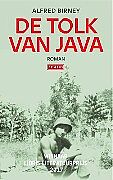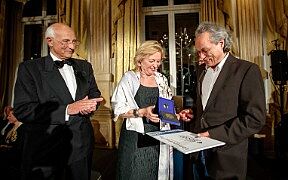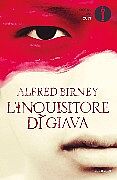De tolk van Java (Alfred Birney)

In 2016 the Dutch author Alfred Birney published his novel “De tolk van Java”, which was released by the Dutch publishing house “De Geus”.
Alfred Birney is a Dutch author of novels and essays. He was born in The Hague in 1951 by an Indo- Dutch father and a Dutch mother. His father had Indonesian, Chinese and Scottish origins, this explains the Anglo-Saxon surname “Birney”.
Until the age of thirteen, he grew up in The Hague with his parents and then attended boarding schools in Voorschoten, Arnhem and Scheveningen. In his twenties he followed a bohemian lifestyle, he also wrote his first book, which he threw away. Birney also worked as a guitar teacher but since his left arm was seriously harmed, he started to focus more seriously on his writing career. He made his debut in 1987 with the novel “Tamara’s lunapark”, that won the G.W.J. Paagman price in 1991. Eleven years later, Birney published the book “Oost-Indische inkt. 400 jaar Indie in de Nederlandse letteren”, that caused some critics and controversies within the authors of Indian literature. In 2000 and 2002, two of his most famous novels, “Vogels rond een vrouw” (1991) and “De onschuld van een vis” (1995) were translated into Indonesian.

In 2016, Birney published his novel “De tolk van Java”, where the protagonist, Alan Noland, reads through the memoirs of his violent Indonesian father, Arto Nolan, who was the illegitimate son of a European colonial man and a Chinese concubine and lived in the former Dutch colony, Indonesia. Even though he was never acknowledged by his father, Arto had always supported the Dutch occupation in Indonesia. He also ended up becoming an interpreter for the Allied forces, thanks to his knowledge of 15 different languages, such as Arab and Chinese. His work for the Dutch army was however very violent, he took advantage of his position to extort confessions and to abuse Indo prisoners between 1946 and 1949. As soon as Indonesia gained independence under the Indonesian revolutionary Sukarno, Arto was forced to flee the country in order not to be executed as a traitor. He finally went to The Netherlands and married a Dutch woman. He wanted to feel integrated in the society but had to face the rather strong racial prejudice, that saw him as a foreigner and not a Dutch. Arto’s disappointment burst out on his children, who were victims of violent abuses and were also abandoned by their mother. Meanwhile the father typed every night on a Remington his memoirs and his disappointments. “De tolk van Java” is therefore a story divided in two halves, the first one being Arto’s memoirs of the Dutch colony in the 1940s and his experience in The Netherlands. The other half of the novel contains the point of view of Alan, his son, who analyzes and judges the character of his violent father.
“De tolk van Java” was released by the Dutch publishing house De Geus, that was founded in 1983 by Eric Visser and Annemie Jans with the aim to publish authors from many different cultures. Through its 38-year history, De Geus has published books in 39 languages and authors like Cees Noteboom, Kader Abdollah and fourteen Nobel Prize winners.
Birney’s 2016 novel has sold more than 100.000 copies in the Netherlands just in the first year of its release. Alfred Birney also won the “Libris Literatuur Prijs”, which is an award for the best Dutch novel of the year, and the “De Henriette Roland Holst” price, given by the “Maatschappij der Nederlandse Letterkunde” (Society of Dutch Literature), in the name of the poetess Henriette Roland Holst- van der Schalk, to a novel that excels by social conscience and literary level. “De tolk van Java” received also positive reviews by the Dutch newspapers “Volkskrant”, that has called it a masterpiece, and by another important author of Dutch Indies literature, Adriaan van Dis, famous for novels like “The Indies books”, published in 2012. Birney’s novel was also adapted for the theater in 2019 by director Ignace Cornelissen. The focus of the play was set on the memories of the father Arto, such as recollections of executions, street roundups and tortures.



“De tolk van Java” was translated into Italian in 2020 and published by Mondadori, an important Italian publishing house founded in 1907 by Arnoldo Mondadori in a small city near Mantova, in Northern Italy. The book reaped great success in Italy as the many reviews written by important Italian newspapers can witness. The Dutch professor at the University of Bologna, Marco Prandoni, has written a review as well as a summary of Birney’s novel for the newspaper “Il Manifesto”. The journal “Il Riformista” has published a review by the writer Eraldo Affinati. In both articles, the writers explain how the history of the Dutch colonies is not well known in Italy and how a book such the one by Birney is very important for the Italian readers.
This novel marks the first and only of Birney’s books to be translated into Italian and was adapted by Mario Corsi, pseudonym of David Santoro. He was born in Rome and has lived in Belgium, where he attended university, and in Japan. After his studies in “Intercultural Management” in Mechelen (Belgium), he began his career as translator and journalist. He wrote for some Italian newspapers such as “Alias”, “Il giornale della Musica” and he also worked for Italian radio stations like Radio3. David Santoro is also the translator of the Dutch author Cees Nooteboom, for which he has translated the novel “Philip en de anderen” in 2005.
As far as Birney’s biography is concerned, until the age of thirteen, he grew up in The Hague with his parents and then attended boarding schools in the cities of Voorschoten, Arnhem and Scheveningen. In his twenties he followed a bohemian lifestyle, he also wrote his first book, which he threw away. Birney also worked as a guitar teacher but since his left arm was seriously harmed, he started to focus more seriously on his writing career. He made his debut in 1987 with the novel “Tamara’s lunapark”, that won the G.W.J. Paagman price in 1991. Eleven years later, Birney published the book “Oost-Indische inkt. 400 jaar Indie in de Nederlandse letteren”, that caused some critics and controversies within the authors of Indian literature. In 2000 and 2002, two of his most famous novels, “Vogels rond een vrouw” (1991) and “De onschuld van een vis” (1995) were translated into Indonesian.
Alfred Birney represents the second generation of Indonesian authors, along with Marion Bloem, Adriaan van Dis and Theodor Holman. Modern literary experts refused to use the term Indisch (Indonesian in English) to refer to these authors and chose instead the expression postcolonial literature. Nonetheless, in his 2011 collection of essays “Yournael van Cyberney”, Birney rejects any form of categorization of his person. There are also some of his novels and stories that do not deal with the themes of postcolonial literature. These themes are for example the memory, that in Birney’s work is linked to the years spent in boarding schools. In the novel “Het verleden tijd” (2000) it seems like the author tries to reach a summary of his various motifs.
After the success gained thanks to the books published in the early 2000s, Birney took some time off and came back in 2009 with a trilogy: “Rivier de Lossie” (2009), “Rivier de Ijssel” (2010) and “Rivier de Brantas” (2011). The story narrated in these books goes from the year 1750 to 250 years later. The most important role in this trilogy is played by three countries, respectively Scotland, The Netherlands and Indonesia, where the protagonist search for traces of the past.
In 2012 Birney published the sequel to “Oost-Indische inkt. 400 jaar Indië in de Nederlandse letteren” (1998) and “Yournael van Cyberney” (2001), a novel called “De dubieuzen”. In this work, Birney exposes the Netherlands’ lack of knowledge of its own colonial history through examples from books by forgotten postcolonial writers.
(Jasmine Dall'Arche)
